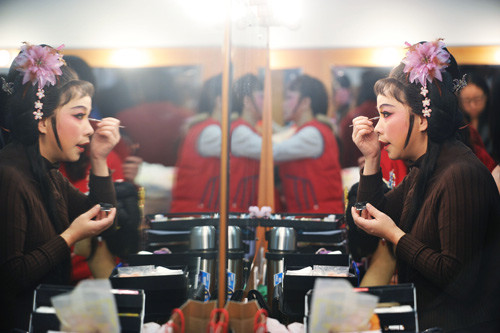|
 |
|
IN THE MIRROR: A performer applies makeup before a show in Beijing on November 4 (WEI YAO) |
"They don't know much about the modern urban lifestyle. We have few things in common. But I know they love the Yueju opera, so I want to learn it and perform for them," Dai said.
Having discovered the troupe online, Dai joined in on the weekends to receive training by Cheng, eventually developing an appreciation for the art.
"Not long ago I performed some songs for my grandparents. They were very excited when they found out I would sing for them," Dai said. "Yueju opera is a spiritual remedy for both me and my grandparents."
"Our troupe is always open to all Yueju opera lovers," said Cheng. "For young people, we hope they can learn to enjoy this traditional stage art."
A different story
Because the troupe has developed a reputation for putting on dazzling performances since its debut, one famous Yueju opera artist entrusted the troupe with a performance piece written exclusively for the group.
Most Yueju opera involves traditional love stories. Fed up with predictable female characters, Jin Yulin, a Yueju master, was determined to do something different.
Huang Dao Po, written by Jin, was performed by the troupe in July in Beijing.
Specifically, the story is about the life of Huang Dao Po (1245-1330), a widely known figure in Chinese history who improved textile technology and helped workers learn her advanced spinning skills. In the adaptation, Huang sacrifices love for the sake of her work.
Zhao Danyu was cast as the lead. The 60-year-old was first trained in Yueju opera only four years ago and her initial instructor was Jin. Several years later when the two crossed path again, Jin was impressed with Zhao's progress and wrote Huang Dao Po for her and the troupe.
"The biggest challenge for Beijingers like me to learn Yueju opera is language," said Wang Yan, another performer in the troupe. "The dialect in Yueju opera is from Zhejiang Province, very different from that we speak in Beijing.
"Therefore, I made an effort to learn the Zhejiang dialect. I joined a local troupe in Hangzhou as an apprentice. After several years with these Zhejiang colleagues, I was finally able to speak like a Zhejianger."
Huang Dao Po has so far been performed in Beijing and some other places since May, with more performances planned for the future. The opera was recognized by the Beijing Municipal Government for its part in enhancing the city's culture.
"In spite of all our success, we will continue to learn and grow," Cheng said. "Yueju opera is a traditional cultural treasure. Every part of it, from voice to gesture, takes a long time to master."
Yueju Opera
Yueju opera was originated from the traditional local opera of Shengzhou, a county of Shaoxing City in east China's Zhejiang Province, in the mid-19th century. It was first named Yueju opera in Shanghai in 1925.
Yueju opera differs from other traditional operas in that it consists largely of a female cast.
After a century and a half, Yueju opera has become the second most popular form of local opera in China after Peking Opera.
In 2006, Yueju opera was listed as China's "intangible cultural heritage" by the State Council in China.
Email us at: baishi@bjreview.com | 